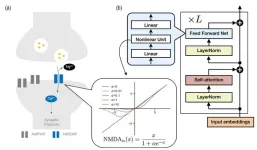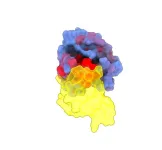(Press-News.org) December 18, 2023—(BRONX NY)—Neurologists often diagnose Alzheimer’s disease after evaluating patients during lengthy, in-person office visits. This poses a significant challenge for many groups, particularly people with limited access to specialized care, including people from historically marginalized groups and people living in rural areas.
Albert Einstein College of Medicine has received a five-year, $10.9 million grant from the National Institutes of Health (NIH) to study whether remote neuropsychological testing can substitute for in-person office visits when assessing whether people have Alzheimer’s disease or other dementias.
“In-person assessments are the gold standard when it comes to measuring cognitive impairment in clinical practice and in research studies of Alzheimer’s disease,” said Richard B. Lipton, M.D., a multi-principal investigator on the grant, vice chair of neurology at Einstein and Montefiore Health System, and director of the Einstein Aging Study (EAS), the long-running study of normal brain aging and dementia in Bronx residents. “However, valid alternatives are urgently needed in situations where in-person assessment is not feasible.”
According to the Alzheimer’s Association, 6.7 million Americans over 65 are living with Alzheimer’s disease, and the number may grow to a projected 12.7 million by 2050, barring medical breakthroughs. Twenty U.S. states are considered “dementia neurology deserts,” with fewer than 10 neurologists per 10,000 people with dementia.
In their NIH-funded study, Dr. Lipton and colleagues will compare in-person to remote evaluation of older adults with the goal of refining and validating a set of remote-testing methods referred to as the Remote Cognitive Aging and Alzheimer’s Disease REsearch (R-CARE) Toolbox. The study’s participants will be 600 dementia-free, racially and ethnically diverse Bronx residents (200 non-Hispanic Blacks, 200 Hispanics, and 200 non-Hispanic whites) aged 65 and older. At the start of the study, all participants will undergo comprehensive assessments for cognitive and functioning abilities both in-person and remotely, with a 2-to-6-week interval between the two testing modes.
Following baseline testing, participants will be followed with in-person and remote assessments, at 18 and 36 months. Digital biomarkers for dementia (computerized tests and speech-based biomarkers) will be collected during remote assessments and blood-based dementia biomarkers (amyloid beta and phosphorylated tau, for example) will be collected from all participants.
“Although the study participants are drawn from an urban population, we’re confident that our findings regarding remote cognitive testing will apply to the millions of people in rural areas who lack access to in-person testing,” said Dr. Lipton, who is also professor in the Saul R. Korey Department of Neurology, of psychiatry and behavioral sciences, of epidemiology & population health and is the Edwin S., Lowe Chair in Neurology at Einstein and a clinical neurologist at Montefiore. “And thanks to the ethnic and racial diversity of our study participants, our results should lead to a better understanding of disparities in Alzheimer’s disease and related dementias, which in turn will have implications for intervening in and for monitoring disease progression in future studies.”
The other principal investigators on the grant are Ali Ezzati, M.D., adjunct clinical assistant professor in The Saul R. Korey Department of Neurology at Einstein and associate professor of neurology at the University of California, Irvine School of Medicine; and Laura Rabin, Ph.D., visiting research professor in The Saul R. Korey Department of Neurology at Einstein. Mindy Katz, M.P.H., senior staff scientist in The Saul R. Korey Department of Neurology, will play a key role as a co-investigator. The grant, “Validation of the Remote Cognitive Aging and Alzheimer’s Disease REsearch (R-CARE) Toolbox for Diverse Populations,” is funded by the National Institute on Aging, part of the NIH. (1R01AG080635-01A1)
***
About Albert Einstein College of Medicine
Albert Einstein College of Medicine is one of the nation’s premier centers for research, medical education and clinical investigation. During the 2022-23 academic year, Einstein is home to 740 M.D. students, 194 Ph.D. students, 118 students in the combined M.D./Ph.D. program, and approximately 225 postdoctoral research fellows. The College of Medicine has more than 1,900 full-time faculty members located on the main campus and at its clinical affiliates. In 2022, Einstein received more than $202 million in awards from the National Institutes of Health. This includes the funding of major research centers at Einstein in cancer, aging, intellectual development disorders, diabetes, clinical and translational research, liver disease, and AIDS. Other areas where the College of Medicine is concentrating its efforts include developmental brain research, neuroscience, cardiac disease, and initiatives to reduce and eliminate ethnic and racial health disparities. Its partnership with Montefiore, the University Hospital and academic medical center for Einstein, advances clinical and translational research to accelerate the pace at which new discoveries become the treatments and therapies that benefit patients. For more information, please visit einsteinmed.edu, follow us on Twitter, Facebook, Instagram, LinkedIn, and view us on YouTube.
END
WASHINGTON, Dec. 18, 2023 — There’s a microscopic battle happening right before our eyes, involving the critical issue of antibiotic resistance. Witness the historical development of antibiotics, from penicillin's accidental discovery to the ongoing battle against superbugs. https://www.youtube.com/watch?v=OCR5wFWSGlA
Reactions is a video series produced by the American Chemical Society and PBS Digital Studios. Subscribe to Reactions at http://bit.ly/ACSReactions and follow us on Twitter @ACSReactions.
The American Chemical Society (ACS) is ...
An interdisciplinary team consisting of researchers from the Center for Cognition and Sociality and the Data Science Group within the Institute for Basic Science (IBS) revealed a striking similarity between the memory processing of artificial intelligence (AI) models and the hippocampus of the human brain. This new finding provides a novel perspective on memory consolidation, which is a process that transforms short-term memories into long-term ones, in AI systems.
In the race towards developing ...
Since 2009, the Cambridge Conservation Initiative has coordinated an annual horizon scan, a well-established method for predicting which threats, changes, and technologies will have the biggest impact on biological conservation in the following year. This year, the 15th horizon scan included 31 scientists, practitioners, and policymakers who developed a list of 96 issues, which they eventually narrowed down to the fifteen most novel and impactful. Their findings, publishing in the journal Trends in Evolution & Ecology ...
Toothbrushing also associated with lower rates of ICU mortality, shorter duration of mechanical ventilation, and shorter ICU length of stay
Researchers say toothbrushing could be a cheap but effective way to help lower rates of hospital-acquired pneumonia
Researchers have found an inexpensive tool that may help reduce rates of pneumonia for hospitalized patients—and it comes with bristles on one end. A new study by investigators from Brigham and Women’s Hospital, a founding member of the Mass General Brigham healthcare system, and Harvard Pilgrim Health Care Institute ...
As climate change redistributes terrestrial ecosystems across the globe, the world’s natural capital is expected to decrease, causing a 9% loss of ecosystem services by 2100. That’s according to a study of natural capital published today in the journal Nature led by scientists at the University of California, Davis, and Scripps Institution of Oceanography at UC San Diego.
Breathable air, clean water, healthy forests and biodiversity all contribute to people’s well-being in ways that ...
About The Study: The results of this study raise concerns that benefit programs may add relative advantages for white children compared with Black and Hispanic children and contribute to racial and ethnic disparities in child protective services investigations. States’ eligibility criteria and distribution practices should be examined to promote equitable effects on adverse child outcomes.
Authors: Henry T. Puls, M.D., of Children’s Mercy Kansas City, is the corresponding author.
To access the embargoed study: Visit our For The Media website ...
About The Study: The findings of this systematic review and meta-analysis of 15 randomized clinical trials with an effective population size of 2,786 patients suggest that daily tooth brushing may be associated with significantly lower rates of hospital-acquired pneumonia, particularly in patients receiving mechanical ventilation, lower rates of intensive care unit (ICU) mortality, shorter duration of mechanical ventilation, and shorter ICU length of stay. Policies and programs encouraging more widespread and consistent toothbrushing ...
Researchers at the Centre for Genomic Regulation in Barcelona, Spain, and the Wellcome Sanger Institute near Cambridge, UK, have comprehensively identified the allosteric control sites found in the protein KRAS. These are highly sought after targets for drug development, representing secret vulnerabilities which can be exploited to control the effects of one of the most important causes of cancer. The study presents the first complete control map for any protein and is published today (18 December) in the journal Nature.
KRAS ...
Research pioneer Dr. Daniel Drucker has much to be proud of, as the GLP-1-based diabetes drugs hailing from his early research are named 2023 breakthrough of the year by the Science Magazine.
Not only have millions of people with type 2 diabetes benefitted from GLP-1 agonists, but the drugs also produced wide-ranging health benefits beyond weight loss in two recent patient trials.
For years, GLP-1 agonists have been known to have a fortuitous side effect of improving metabolic health, but how this is regulated in the body remains unclear. Now Dr. ...
Ecological restoration may save coral atoll islands from the rising seas of climate change, according to an international team of scientists, conservationists, and an indigenous leader.
While global carbon emission reduction is imperative, local measures could be the key to the islands outpacing sea levels, they argue today in the journal Trends in Ecology & Evolution.
“Far from being doomed, in their natural state most coral atoll islands could adapt to sea level rise”, says Dr Sebastian Steibl from the University of Auckland ...








